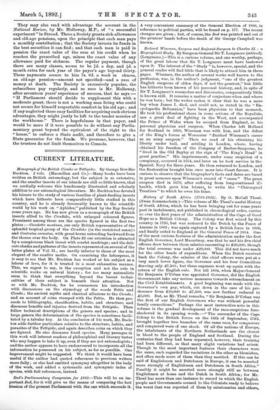Richard Wiseman, Surgeon and Serjeant - Surgeon to Charles II.: a Biographical
Study. By Surgeon-General Sir T. Longmore (retired). (Longmans.)—This is a curious volume, and one worthy, perhaps, of the great labour that Sir T. Longmore must have bestowed upon it. The interest of the " Study " is, however, special, and the general reader will find little that is likely to attract him in these pages. Wiseman, the author of several works well known to the profession, was, in the author's judgment, " one of the greatest English surgeons of olden days, if not the greatest," but little has hitherto been known of his personal history, and, in spite of Sir T. Longmore's researches and discoveries, comparatively little is known still. It remains a matter of conjecture when and where he was born; but the writer makes it clear that he was a mere boy when James I. died, and could not, as stated in the " En- cycloptedia Britannica," have been physician to that monarch. He took his professional share in some actions of the Royalists, saw a great deal of fighting in the West, and accompanied the Prince of Wales when he escaped from England, as his personal physician and surgeon. When Charles left Holland for Scotland in 1650, Wiseman was with him, and the defeat of the King's forces at Worcester " finished Wiseman's career as an army surgeon." Then we read of his obtaining his liberty under bail, and settling in London, where, having obtained his freedom of the Company of Barber-Surgeons, he " lived in the Old Bayley at the sign of ' The King's Head' in great practise." His imprisonment, under some suspicion of a conspiracy, occurred in 1654, and later on he took service in the Spanish Navy for three years. He then returned to London, and the Restoration brought him once more into Court favour. It is curious to observe that the biographer's facts and dates are based in great measure upon Wiseman's record of "cases." The great surgeon died in 1676, after suffering from long-continued health, which gave him leisure, to write the " Chirurgical Treatises" to which he owes his fame.


































 Previous page
Previous page